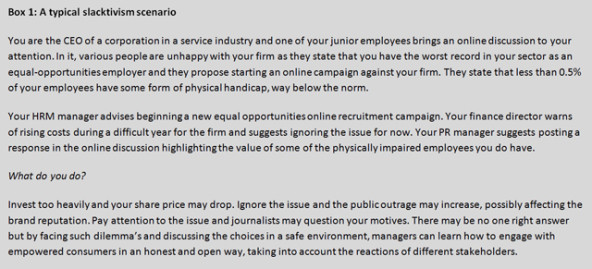The activist campaign Move Your Money UK claims to have motivated half a million customers in 2012 alone to move savings from high street banks to credit unions and building societies. This is not the terror image of a bank-run on a single bank, but a steady and painful march away from an entire sector, enabled by the simplicity of Internet banking. Fueled by bonus scandals and the Liborgate affair, the long-trusted, big-name banks are losing credibility, and this bleeding of ordinary people’s reserves is making their position even worse. The question remains: How did this campaign mobilize the generally nonactivist majority after decades of customer loyalty, and what can the sector do to win back hearts and minds?
Consumers often have opinions on issues that they encounter in the news or in discussions with friends. Often these sentiments are short-lived and impact only the people within earshot. When these same opinions are expressed on social media, however, they become public and remain visible; they also add up to a wave of public opinion that is hard to ignore. Such a reservoir of online sentiment drives a new sort of dialogue between stakeholders in markets, including the public, firms, customers and shareholders, governments, pressure groups, and the traditional media. This is the phenomenon we call “slacker activism” or “slacktivism.” In contrast to traditional activism, which requires a significant commitment from participants, slacktivism networks are complex, loosely organized, and hard to predict. Participants can join in by simply passing along a message, and slacktivist campaigns can appear more suddenly than offline campaigns. And despite its derogatory root, ”slacker,” this ad-hoc online movement can truly pressurize organizations: If the message is controversial, organizations under scrutiny are pressured to react quickly, even though there is a danger that their response could actually worsen the situation. George Day illustrates this danger with the classic case of Greenpeace’s online protest against Nestlé in 2010:
“An extreme example … comes from Nestlé’s recent experience with an orchestrated campaign by Greenpeace to protest the company’s purported use of palm oil from plantations in Indonesia that did not follow industry guidelines for protecting rainforests and orangutans. By most traditional measures, Nestlé responded very well: Within hours of Greenpeace launching the campaign, Nestlé responded by reiterating its commitment to sustainable sources of palm oil, suspended the supplier in question, and announced an audit of all of its palm oil suppliers. However, a low-level marketing staffer overseeing Nestlé’s Facebook page engaged in several ill-tempered electronic exchanges with users, which added fuel to the fire, gave the protest legs, and did even more damage to the brand.”
But slacktivism is not all about angry consumers or NGOs attacking firms. Firms themselves can use social media to proactively reach out to the same people—for example to engage consumers in discussions about sustainability issues. Ambitious organizations that want to connect with their community or customers in new ways are embracing this online exchange, but many are unsure how to engage with consumers beyond their normal marketing activities. The key is to find the optimal online strategy for different brands, different issues, and different market segments. Connecting with communities and consumers using social media, both reactively and proactively, provides organizations with new and powerful opportunities. But only if they get it right, and the difficulty of responding adequately to slacktivist campaigns is further exacerbated when different stakeholders hold conflicting opinions. How do organizations ensure that their managers are able to think in this new way?
Are you enjoying this article? Read more like this, plus SSIR's full archive of content, when you subscribe.
Enter the serious game—a game that places organization managers in realistic but hypothetical situations that allow them to experience the difficulties of making good decisions and help them see the (often unintended) consequences of their actions. These can be computer programs, or board or card games, and they can be an effective way for managers to acquire new skills and knowledge, as William Brindley describes in his recent Stanford Social Innovation Review blog post “Gaming with a Purpose.” As slacktivism is a relatively new phenomenon to managers, a serious game can be a good way to let them experience the dilemmas of interacting with online communities. For example, an online protest is often seen as a cyber-threat, whereas from a customer perspective, it might be an opportunity to connect with concerned customers.
We, as researchers, are building a serious game that presents managers with slacktivism campaigns so that they can learn how to engage with the online masses via social media. Similar to the crisis management game Learning for Security and the cybersecurity game Agent Surfire, the slacktivism game we are building provides managers a risk-free training environment to practice and discuss their decisions with other players. The game engine is based on previous slacktivism research and models the behavior of online stakeholders, such as online customer communities or media pundits. Every turn in the game, players jointly decide how to respond to a dilemma posed by a slacktivist scenario. At the end of the game, players get feedback on their profile and performance. CSR and communication managers can use the game to practice with realistic online scenarios. Online campaigners and lobbyists at activist organizations can also practice with this game to increase the effectiveness of their campaigns.

In sum, firms have a lot to gain by entering into the online dialogue and aligning their brand’s values with those of the consumers they serve beyond the traditional marketing message. And they have a lot to lose when they fail to connect to the growing slacktivist majority. We believe that a slacktivism serious game fills the knowledge and skills lacuna of firms in a fun, involving, and risk-free way.
Support SSIR’s coverage of cross-sector solutions to global challenges.
Help us further the reach of innovative ideas. Donate today.
Read more stories by Tijs van den Broek & David Langley.

